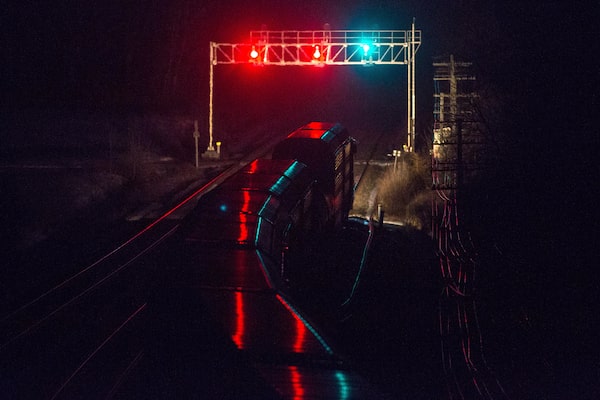
A CN train travels through Tyendinaga, near Belleville, Ont., on Monday Feb. 24, 2020, after police removed the blockade in support of Wet'suwet'en Nation hereditary chiefs attempting to halt construction of a natural gas pipeline on their traditional territories in northern B.C.Lars Hagberg/The Canadian Press
Canadian National Railway Co. resumed freight-train service on its main line east of Toronto, after Ontario Provincial Police detained protesters and dismantled a blockade that was erected more than two weeks ago and shut down rail traffic in much of Eastern Canada.
Trains began running again on Monday evening after safety inspections okayed the tracks in Tyendinaga Mohawk territory near Belleville, Ont., but the situation remains fluid and the continued presence of protesters near the line could force another halt to service, said Jonathan Abecassis, a spokesman for Canada’s largest railway.
The protest on the site began on Feb. 6, one of many across the country in support of the Wet’suwet’en hereditary chiefs who oppose the Coastal GasLink pipeline in northern British Columbia.
“CN is pleased that the illegal blockade in Tyendinaga has come to an end,” Mr. Abecassis said, adding trains cannot simply slow down in the presence of protestors because that raises the risk of collisions or illegal boarding of a train.
The dispute forced CN to suspend service on its eastern network on Feb. 14, cutting off freight service to much of the country east of Toronto, including ports in Montreal and Halifax, and laying off about 450 people. Via Rail, which leases track space from CN, also cancelled most trains and laid off almost 1,000 employees. The passenger rail company has gradually restored service in Southern Ontario and between Ottawa, Montreal and Quebec City, but its trains running east of Toronto remain suspended. Via did not respond to an e-mail and phone call on Monday.
Several other rail blockades have come and gone over the past two weeks, including one that continued on Monday on a track owned by Canadian Pacific Railway Ltd. south of Montreal. Other sporadic protests have halted trains near Saskatoon; Vaughan, Ont.; Prince Rupert, B.C.; and other areas.
Industry groups warned of shortages of water treatment chemicals, propane and even food.
Bob Masterson, president of the Chemistry Industry Association of Canada, welcomed the resumption of rail service; he estimated as many as half a dozen chemical plants faced imminent closing had the blockades continued.
Olin Corp. shut down its plant in Bécancour, Que., a week ago, he said; two more facilities followed suit over the weekend, either because they couldn’t obtain key inputs needed for production, or because they ran out of storage space for completed products that they couldn’t ship.
Bob Ballantyne, president of the Freight Management Association of Canada, which represents large rail customers that include manufacturers and retailers, said the industries that rely on freight trains for raw materials and export had no time to prepare for the shutdown and were left scrambling to meet orders and maintain production. Canada’s reputation as a reliable trading partner is suffering, he said, as ships sit at anchor near Vancouver awaiting cargo, and the ports of Montreal and Halifax are congested with containers awaiting trains.
“I’ve never seen anything like this before,” Mr. Ballantyne said. “I’ve been around the rail industry for getting close to 60 years now. Strikes happen every once in a while and they may last five to seven days. In the past, strikes have usually been ended by government legislation. But this came out of left field with any warning, nobody had a chance to take preventative action beforehand.”
Atlantic Container Line, a major carrier, cancelled its twice-weekly calls at Halifax amid the disruption, diverting ships to New York and other ports on the Atlantic Coast. Ocean Network Express, another container shipping company, whose ships call on Vancouver, Prince Rupert and Halifax, has seen “limited” disruption, said Maria Bodnar, sales director at the company based in Japan and Singapore.
A farmers’ group representing canola growers said it will be a long time before the impact of the rail disruption recedes. The halt to rail shipments to the ports followed the loss of some market access to China and a 2019 harvest that was delayed by heavy precipitation.
“We rely heavily on export markets, with approximately 90 per cent of our canola crop exported every year,” said Bernie McClean, chairman of the Canadian Canola Growers Association. “This crop year has been one of the worst on record and disruptions to our rail system are challenging our ability to respond to the needs of our export customers. We’re seeing ships lining up along the West Coast, unfulfilled rail car orders accumulating, and elevators in the Prairies beginning to reach capacity.”
-with files from Matthew McClearn
Our Morning Update and Evening Update newsletters are written by Globe editors, giving you a concise summary of the day’s most important headlines. Sign up today.